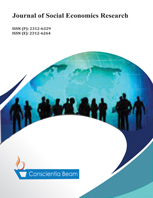The role of social safety nets for poverty reduction in the Kingdom of Saudi Arabia
DOI:
https://doi.org/10.18488/35.v12i1.4086Abstract
The purpose of this research paper is to assess the potential role of social safety nets (SSNs) in poverty reduction in Saudi Arabia, which has received less attention in the empirical literature. Specifically, the paper explores the influence of the “Unemployment Insurance Law (SANED)” on poverty reduction. Credible sources provide quarterly data for the period from 2016 to 2023. The study used the “Autoregressive Distributed Lag Modeling (ARDL)” approach for assessing the short-run and long-run impacts of SANED on poverty reduction. Our results show that the SANED program has significantly contributed to poverty reduction in Saudi Arabia, and its influence is evident both in the short- and the long-run. The estimated model also indicated that higher unemployment rates lead to higher poverty rates, while higher government spending and greater trade openness effectively contributed to reducing poverty burdens. Our results carry significant implications, providing valuable insights to effectively address poverty and enhance economic stability in Saudi Arabia. Therefore, we expect the current study's results to significantly benefit Saudi Arabia's policymakers. Consequently, they could formulate and implement appropriate policies to effectively address the problem of poverty.

